An Analysis of Professional Ethics in Accounting and Finance (HSBC)
VerifiedAdded on 2020/12/18
|13
|4108
|171
Report
AI Summary
This report provides a detailed analysis of professional ethics within the finance and accounting sector, using HSBC as a case study. It covers fundamental principles of ethical behavior, legal and regulatory requirements, and the role of professional bodies like ACCA and CIMA. The report explores the importance of ethical conduct with clients, suppliers, and colleagues, emphasizing objectivity and professional distance. It also examines the significance of adhering to organizational values, codes of practice, and regulations, including policies for handling client monies and the circumstances for disclosing confidential information. Furthermore, the report discusses the risks of improper practices, the importance of vigilance, and opportunities for maintaining up-to-date knowledge. It also addresses reporting procedures for unethical behavior, strategies for preventing ethical conflicts, and the importance of an ethical approach to sustainability within the finance industry. The report concludes with a summary of key findings and a list of references.
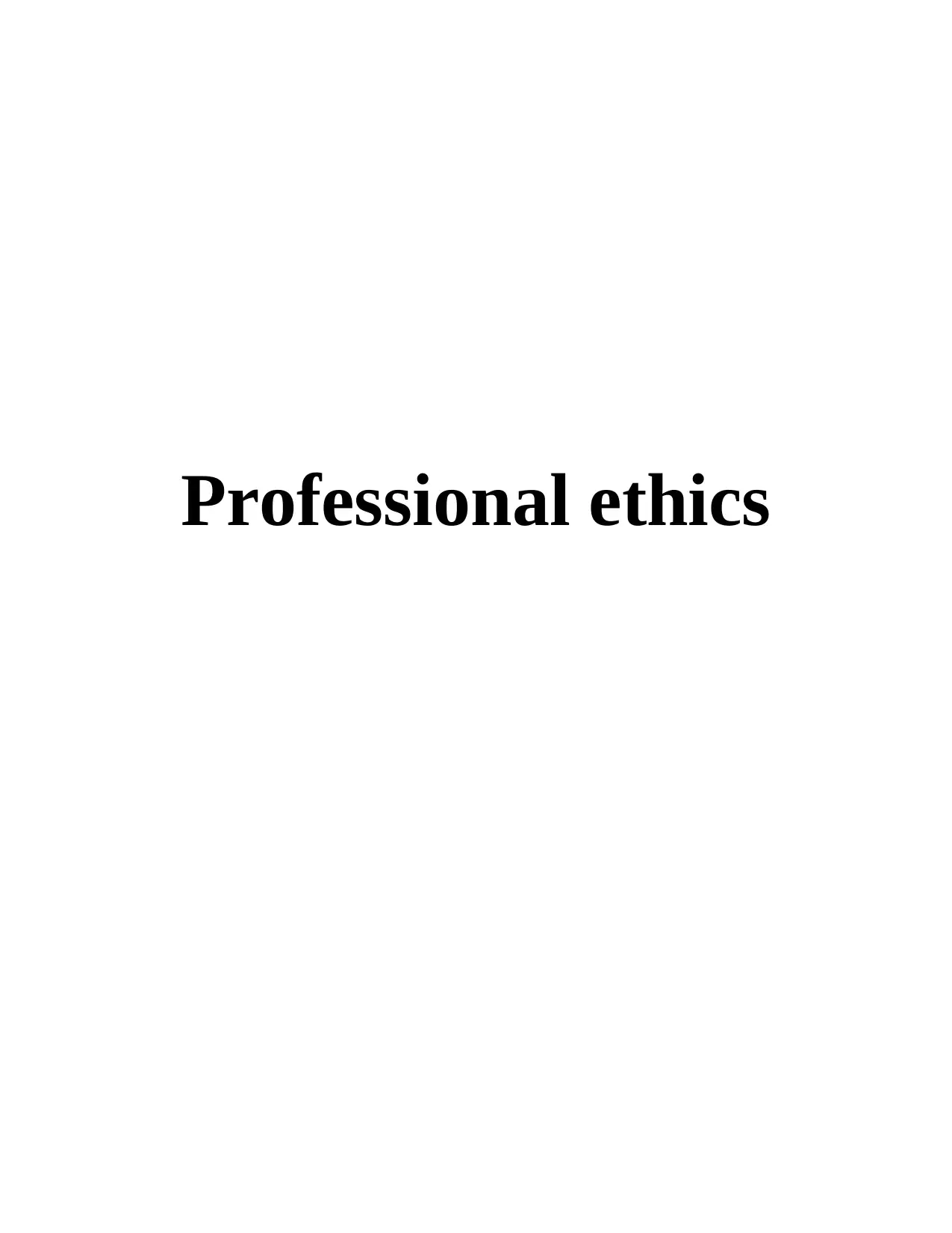
Professional ethics
Paraphrase This Document
Need a fresh take? Get an instant paraphrase of this document with our AI Paraphraser
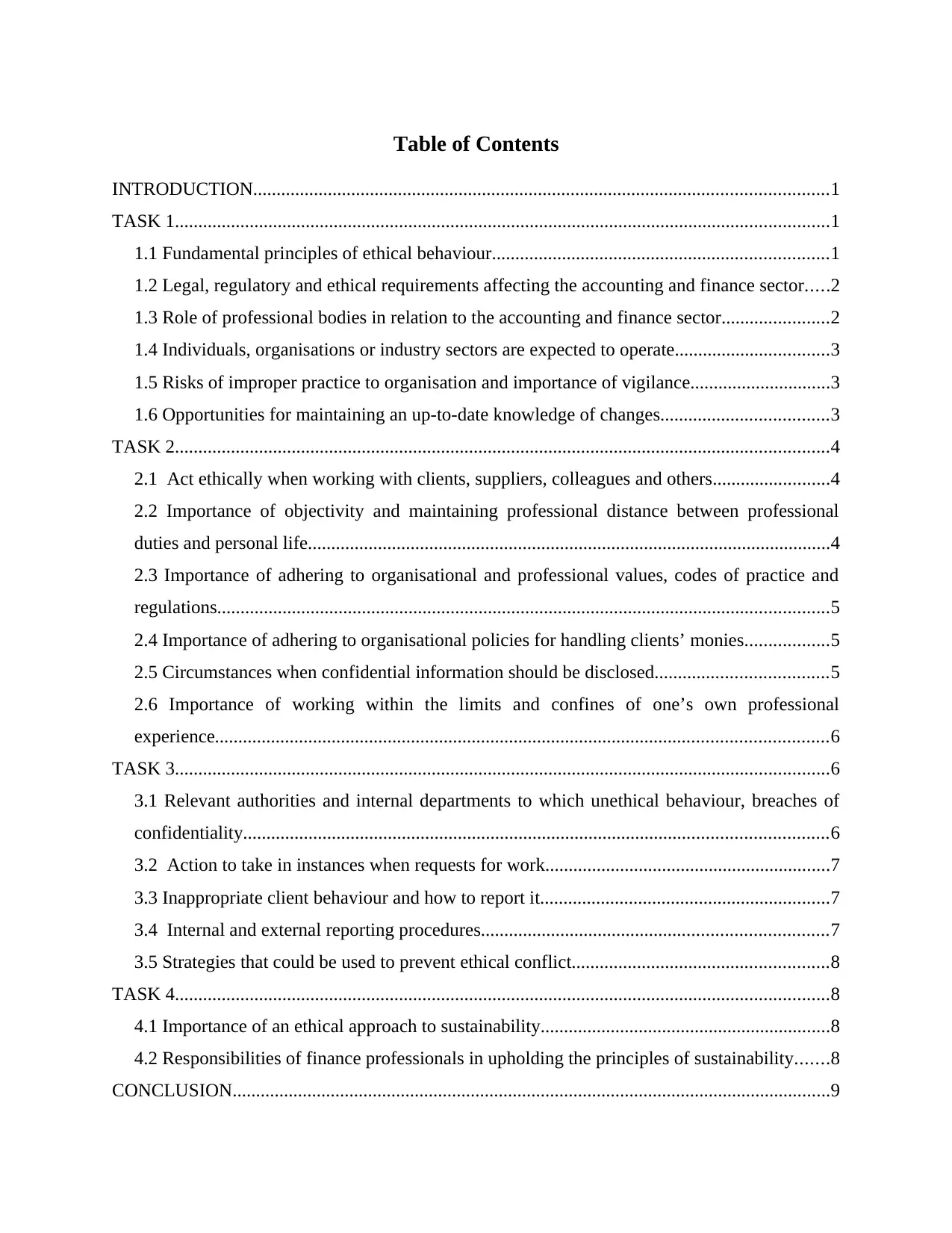
Table of Contents
INTRODUCTION...........................................................................................................................1
TASK 1............................................................................................................................................1
1.1 Fundamental principles of ethical behaviour........................................................................1
1.2 Legal, regulatory and ethical requirements affecting the accounting and finance sector.....2
1.3 Role of professional bodies in relation to the accounting and finance sector.......................2
1.4 Individuals, organisations or industry sectors are expected to operate.................................3
1.5 Risks of improper practice to organisation and importance of vigilance..............................3
1.6 Opportunities for maintaining an up-to-date knowledge of changes....................................3
TASK 2............................................................................................................................................4
2.1 Act ethically when working with clients, suppliers, colleagues and others.........................4
2.2 Importance of objectivity and maintaining professional distance between professional
duties and personal life................................................................................................................4
2.3 Importance of adhering to organisational and professional values, codes of practice and
regulations...................................................................................................................................5
2.4 Importance of adhering to organisational policies for handling clients’ monies..................5
2.5 Circumstances when confidential information should be disclosed.....................................5
2.6 Importance of working within the limits and confines of one’s own professional
experience...................................................................................................................................6
TASK 3............................................................................................................................................6
3.1 Relevant authorities and internal departments to which unethical behaviour, breaches of
confidentiality.............................................................................................................................6
3.2 Action to take in instances when requests for work.............................................................7
3.3 Inappropriate client behaviour and how to report it..............................................................7
3.4 Internal and external reporting procedures..........................................................................7
3.5 Strategies that could be used to prevent ethical conflict.......................................................8
TASK 4............................................................................................................................................8
4.1 Importance of an ethical approach to sustainability..............................................................8
4.2 Responsibilities of finance professionals in upholding the principles of sustainability.......8
CONCLUSION................................................................................................................................9
INTRODUCTION...........................................................................................................................1
TASK 1............................................................................................................................................1
1.1 Fundamental principles of ethical behaviour........................................................................1
1.2 Legal, regulatory and ethical requirements affecting the accounting and finance sector.....2
1.3 Role of professional bodies in relation to the accounting and finance sector.......................2
1.4 Individuals, organisations or industry sectors are expected to operate.................................3
1.5 Risks of improper practice to organisation and importance of vigilance..............................3
1.6 Opportunities for maintaining an up-to-date knowledge of changes....................................3
TASK 2............................................................................................................................................4
2.1 Act ethically when working with clients, suppliers, colleagues and others.........................4
2.2 Importance of objectivity and maintaining professional distance between professional
duties and personal life................................................................................................................4
2.3 Importance of adhering to organisational and professional values, codes of practice and
regulations...................................................................................................................................5
2.4 Importance of adhering to organisational policies for handling clients’ monies..................5
2.5 Circumstances when confidential information should be disclosed.....................................5
2.6 Importance of working within the limits and confines of one’s own professional
experience...................................................................................................................................6
TASK 3............................................................................................................................................6
3.1 Relevant authorities and internal departments to which unethical behaviour, breaches of
confidentiality.............................................................................................................................6
3.2 Action to take in instances when requests for work.............................................................7
3.3 Inappropriate client behaviour and how to report it..............................................................7
3.4 Internal and external reporting procedures..........................................................................7
3.5 Strategies that could be used to prevent ethical conflict.......................................................8
TASK 4............................................................................................................................................8
4.1 Importance of an ethical approach to sustainability..............................................................8
4.2 Responsibilities of finance professionals in upholding the principles of sustainability.......8
CONCLUSION................................................................................................................................9
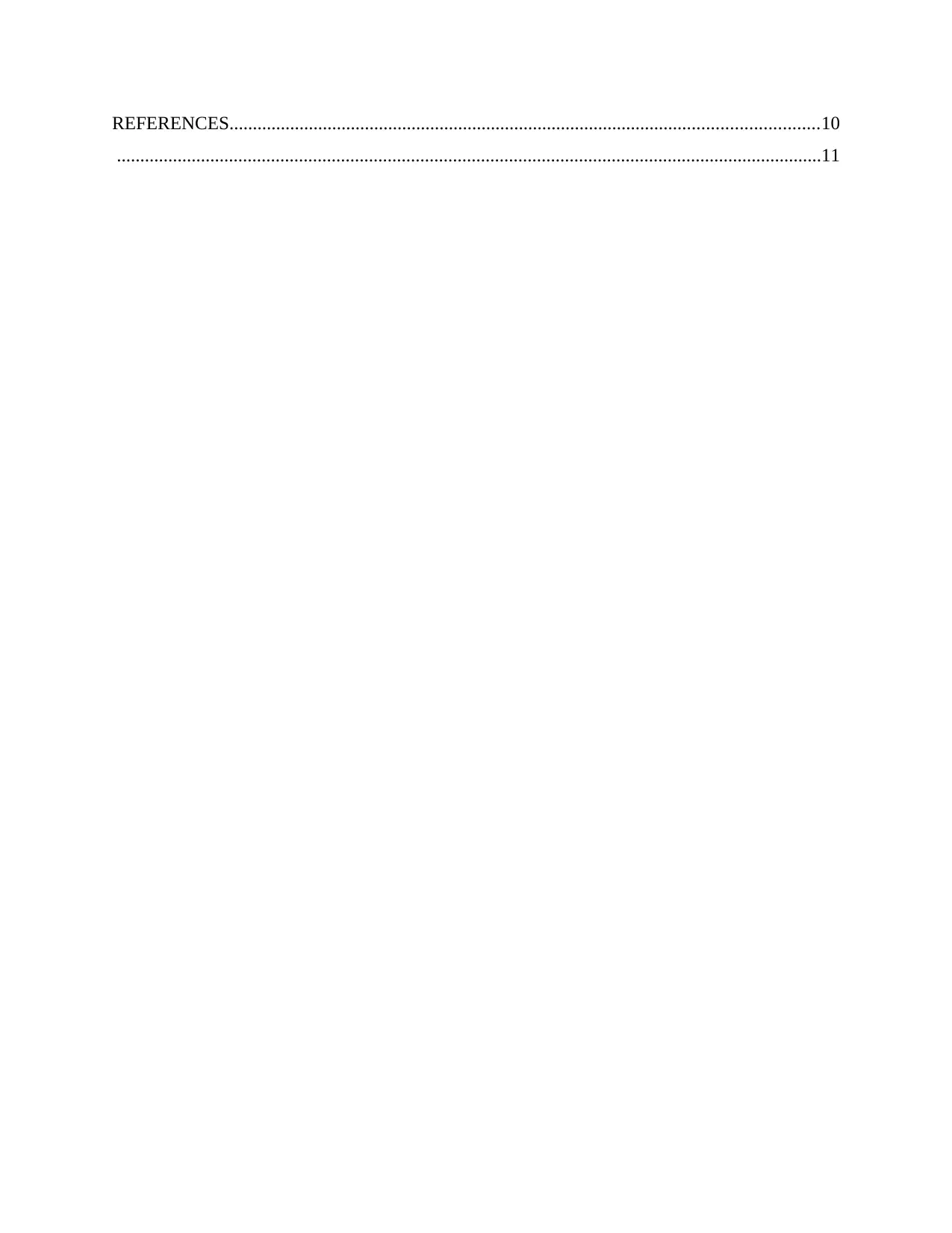
REFERENCES..............................................................................................................................10
.......................................................................................................................................................11
.......................................................................................................................................................11
⊘ This is a preview!⊘
Do you want full access?
Subscribe today to unlock all pages.

Trusted by 1+ million students worldwide
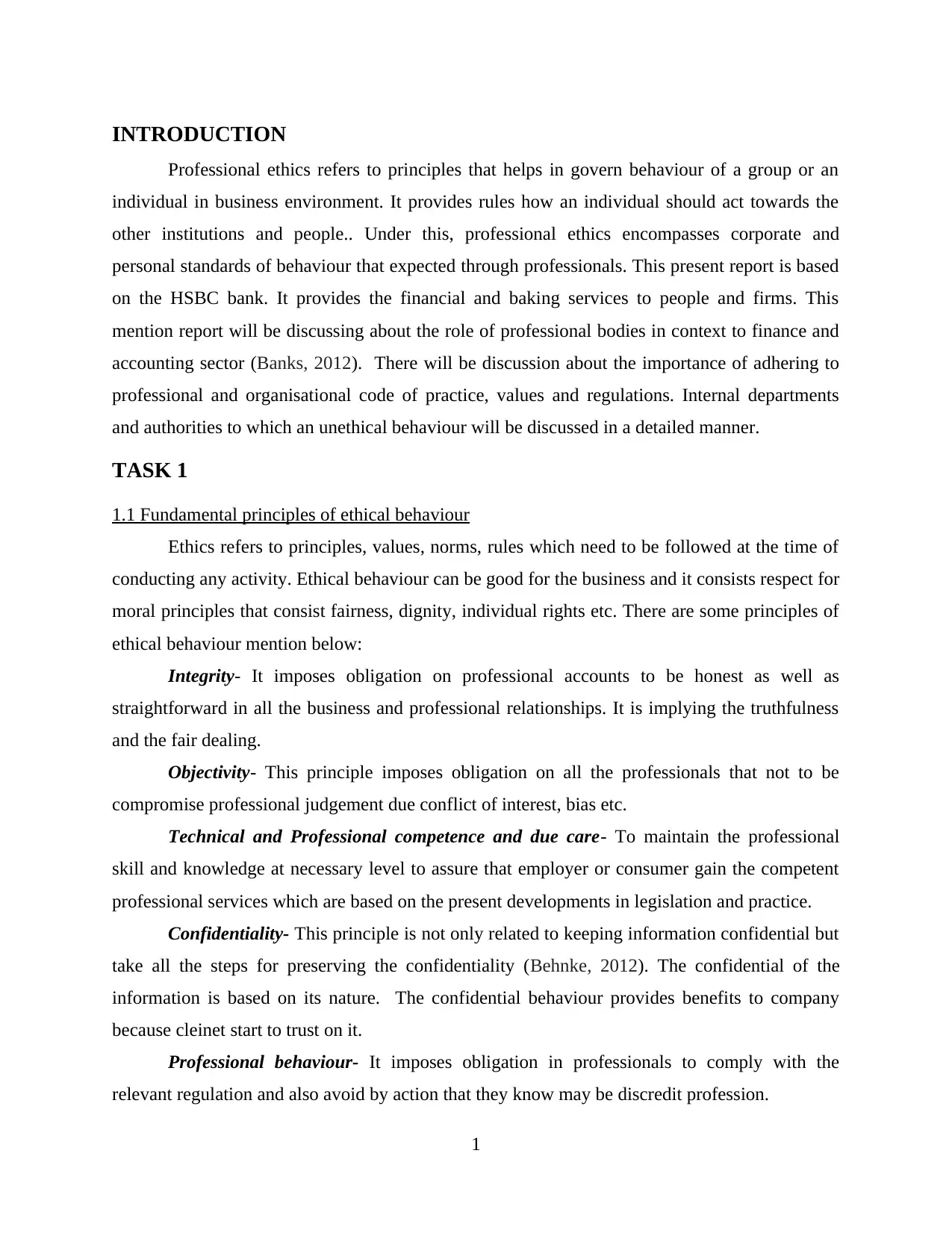
INTRODUCTION
Professional ethics refers to principles that helps in govern behaviour of a group or an
individual in business environment. It provides rules how an individual should act towards the
other institutions and people.. Under this, professional ethics encompasses corporate and
personal standards of behaviour that expected through professionals. This present report is based
on the HSBC bank. It provides the financial and baking services to people and firms. This
mention report will be discussing about the role of professional bodies in context to finance and
accounting sector (Banks, 2012). There will be discussion about the importance of adhering to
professional and organisational code of practice, values and regulations. Internal departments
and authorities to which an unethical behaviour will be discussed in a detailed manner.
TASK 1
1.1 Fundamental principles of ethical behaviour
Ethics refers to principles, values, norms, rules which need to be followed at the time of
conducting any activity. Ethical behaviour can be good for the business and it consists respect for
moral principles that consist fairness, dignity, individual rights etc. There are some principles of
ethical behaviour mention below:
Integrity- It imposes obligation on professional accounts to be honest as well as
straightforward in all the business and professional relationships. It is implying the truthfulness
and the fair dealing.
Objectivity- This principle imposes obligation on all the professionals that not to be
compromise professional judgement due conflict of interest, bias etc.
Technical and Professional competence and due care- To maintain the professional
skill and knowledge at necessary level to assure that employer or consumer gain the competent
professional services which are based on the present developments in legislation and practice.
Confidentiality- This principle is not only related to keeping information confidential but
take all the steps for preserving the confidentiality (Behnke, 2012). The confidential of the
information is based on its nature. The confidential behaviour provides benefits to company
because cleinet start to trust on it.
Professional behaviour- It imposes obligation in professionals to comply with the
relevant regulation and also avoid by action that they know may be discredit profession.
1
Professional ethics refers to principles that helps in govern behaviour of a group or an
individual in business environment. It provides rules how an individual should act towards the
other institutions and people.. Under this, professional ethics encompasses corporate and
personal standards of behaviour that expected through professionals. This present report is based
on the HSBC bank. It provides the financial and baking services to people and firms. This
mention report will be discussing about the role of professional bodies in context to finance and
accounting sector (Banks, 2012). There will be discussion about the importance of adhering to
professional and organisational code of practice, values and regulations. Internal departments
and authorities to which an unethical behaviour will be discussed in a detailed manner.
TASK 1
1.1 Fundamental principles of ethical behaviour
Ethics refers to principles, values, norms, rules which need to be followed at the time of
conducting any activity. Ethical behaviour can be good for the business and it consists respect for
moral principles that consist fairness, dignity, individual rights etc. There are some principles of
ethical behaviour mention below:
Integrity- It imposes obligation on professional accounts to be honest as well as
straightforward in all the business and professional relationships. It is implying the truthfulness
and the fair dealing.
Objectivity- This principle imposes obligation on all the professionals that not to be
compromise professional judgement due conflict of interest, bias etc.
Technical and Professional competence and due care- To maintain the professional
skill and knowledge at necessary level to assure that employer or consumer gain the competent
professional services which are based on the present developments in legislation and practice.
Confidentiality- This principle is not only related to keeping information confidential but
take all the steps for preserving the confidentiality (Behnke, 2012). The confidential of the
information is based on its nature. The confidential behaviour provides benefits to company
because cleinet start to trust on it.
Professional behaviour- It imposes obligation in professionals to comply with the
relevant regulation and also avoid by action that they know may be discredit profession.
1
Paraphrase This Document
Need a fresh take? Get an instant paraphrase of this document with our AI Paraphraser
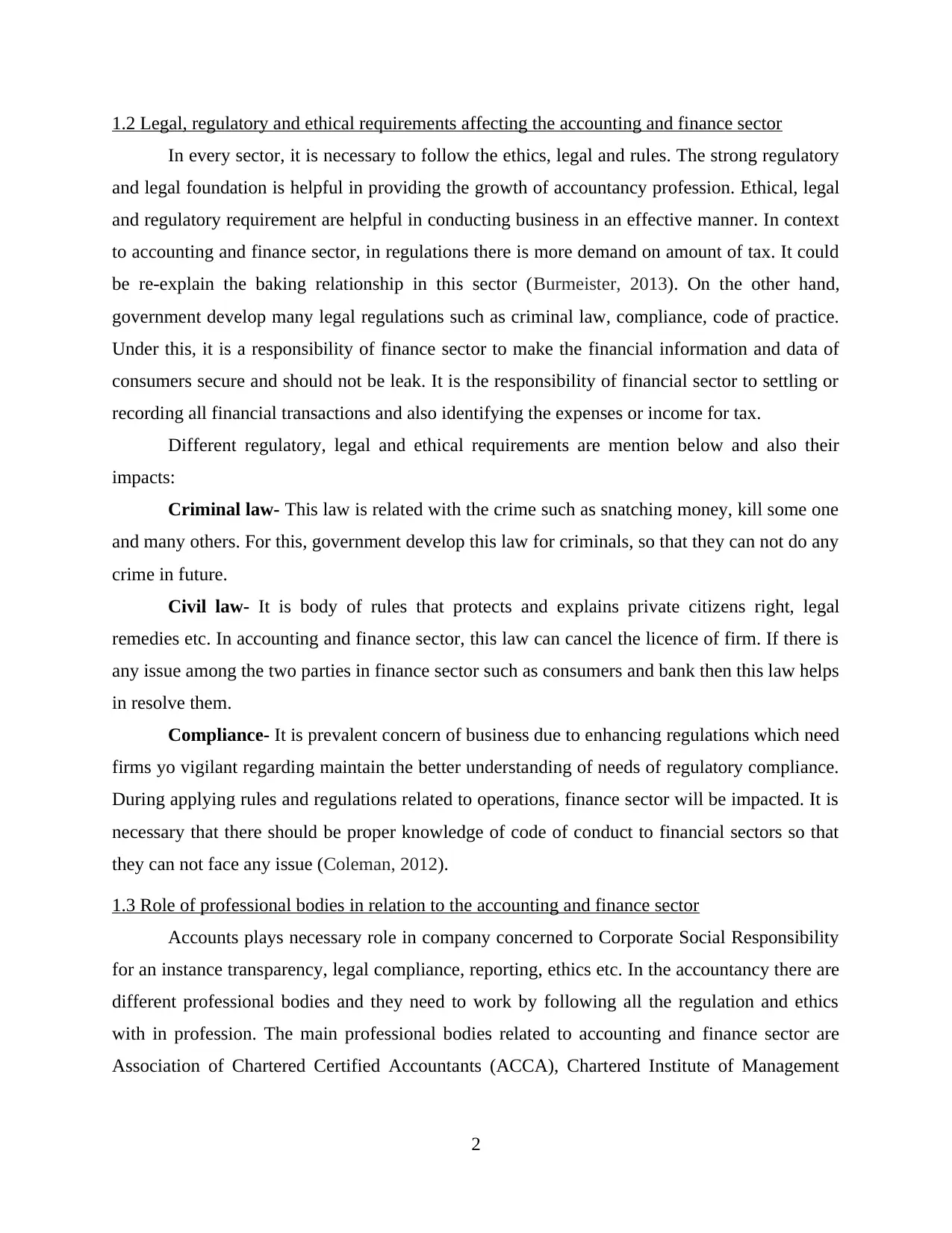
1.2 Legal, regulatory and ethical requirements affecting the accounting and finance sector
In every sector, it is necessary to follow the ethics, legal and rules. The strong regulatory
and legal foundation is helpful in providing the growth of accountancy profession. Ethical, legal
and regulatory requirement are helpful in conducting business in an effective manner. In context
to accounting and finance sector, in regulations there is more demand on amount of tax. It could
be re-explain the baking relationship in this sector (Burmeister, 2013). On the other hand,
government develop many legal regulations such as criminal law, compliance, code of practice.
Under this, it is a responsibility of finance sector to make the financial information and data of
consumers secure and should not be leak. It is the responsibility of financial sector to settling or
recording all financial transactions and also identifying the expenses or income for tax.
Different regulatory, legal and ethical requirements are mention below and also their
impacts:
Criminal law- This law is related with the crime such as snatching money, kill some one
and many others. For this, government develop this law for criminals, so that they can not do any
crime in future.
Civil law- It is body of rules that protects and explains private citizens right, legal
remedies etc. In accounting and finance sector, this law can cancel the licence of firm. If there is
any issue among the two parties in finance sector such as consumers and bank then this law helps
in resolve them.
Compliance- It is prevalent concern of business due to enhancing regulations which need
firms yo vigilant regarding maintain the better understanding of needs of regulatory compliance.
During applying rules and regulations related to operations, finance sector will be impacted. It is
necessary that there should be proper knowledge of code of conduct to financial sectors so that
they can not face any issue (Coleman, 2012).
1.3 Role of professional bodies in relation to the accounting and finance sector
Accounts plays necessary role in company concerned to Corporate Social Responsibility
for an instance transparency, legal compliance, reporting, ethics etc. In the accountancy there are
different professional bodies and they need to work by following all the regulation and ethics
with in profession. The main professional bodies related to accounting and finance sector are
Association of Chartered Certified Accountants (ACCA), Chartered Institute of Management
2
In every sector, it is necessary to follow the ethics, legal and rules. The strong regulatory
and legal foundation is helpful in providing the growth of accountancy profession. Ethical, legal
and regulatory requirement are helpful in conducting business in an effective manner. In context
to accounting and finance sector, in regulations there is more demand on amount of tax. It could
be re-explain the baking relationship in this sector (Burmeister, 2013). On the other hand,
government develop many legal regulations such as criminal law, compliance, code of practice.
Under this, it is a responsibility of finance sector to make the financial information and data of
consumers secure and should not be leak. It is the responsibility of financial sector to settling or
recording all financial transactions and also identifying the expenses or income for tax.
Different regulatory, legal and ethical requirements are mention below and also their
impacts:
Criminal law- This law is related with the crime such as snatching money, kill some one
and many others. For this, government develop this law for criminals, so that they can not do any
crime in future.
Civil law- It is body of rules that protects and explains private citizens right, legal
remedies etc. In accounting and finance sector, this law can cancel the licence of firm. If there is
any issue among the two parties in finance sector such as consumers and bank then this law helps
in resolve them.
Compliance- It is prevalent concern of business due to enhancing regulations which need
firms yo vigilant regarding maintain the better understanding of needs of regulatory compliance.
During applying rules and regulations related to operations, finance sector will be impacted. It is
necessary that there should be proper knowledge of code of conduct to financial sectors so that
they can not face any issue (Coleman, 2012).
1.3 Role of professional bodies in relation to the accounting and finance sector
Accounts plays necessary role in company concerned to Corporate Social Responsibility
for an instance transparency, legal compliance, reporting, ethics etc. In the accountancy there are
different professional bodies and they need to work by following all the regulation and ethics
with in profession. The main professional bodies related to accounting and finance sector are
Association of Chartered Certified Accountants (ACCA), Chartered Institute of Management
2
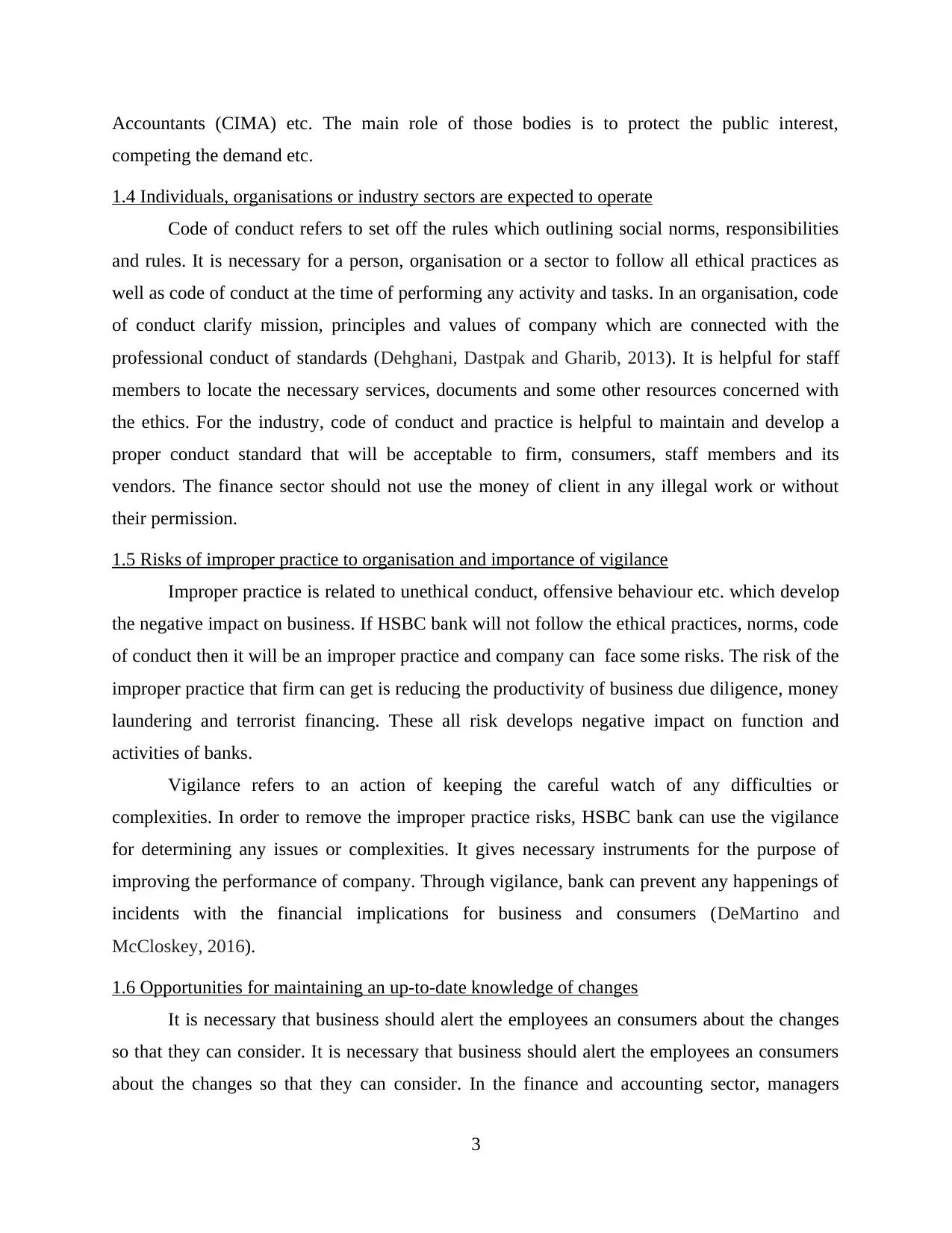
Accountants (CIMA) etc. The main role of those bodies is to protect the public interest,
competing the demand etc.
1.4 Individuals, organisations or industry sectors are expected to operate
Code of conduct refers to set off the rules which outlining social norms, responsibilities
and rules. It is necessary for a person, organisation or a sector to follow all ethical practices as
well as code of conduct at the time of performing any activity and tasks. In an organisation, code
of conduct clarify mission, principles and values of company which are connected with the
professional conduct of standards (Dehghani, Dastpak and Gharib, 2013). It is helpful for staff
members to locate the necessary services, documents and some other resources concerned with
the ethics. For the industry, code of conduct and practice is helpful to maintain and develop a
proper conduct standard that will be acceptable to firm, consumers, staff members and its
vendors. The finance sector should not use the money of client in any illegal work or without
their permission.
1.5 Risks of improper practice to organisation and importance of vigilance
Improper practice is related to unethical conduct, offensive behaviour etc. which develop
the negative impact on business. If HSBC bank will not follow the ethical practices, norms, code
of conduct then it will be an improper practice and company can face some risks. The risk of the
improper practice that firm can get is reducing the productivity of business due diligence, money
laundering and terrorist financing. These all risk develops negative impact on function and
activities of banks.
Vigilance refers to an action of keeping the careful watch of any difficulties or
complexities. In order to remove the improper practice risks, HSBC bank can use the vigilance
for determining any issues or complexities. It gives necessary instruments for the purpose of
improving the performance of company. Through vigilance, bank can prevent any happenings of
incidents with the financial implications for business and consumers (DeMartino and
McCloskey, 2016).
1.6 Opportunities for maintaining an up-to-date knowledge of changes
It is necessary that business should alert the employees an consumers about the changes
so that they can consider. It is necessary that business should alert the employees an consumers
about the changes so that they can consider. In the finance and accounting sector, managers
3
competing the demand etc.
1.4 Individuals, organisations or industry sectors are expected to operate
Code of conduct refers to set off the rules which outlining social norms, responsibilities
and rules. It is necessary for a person, organisation or a sector to follow all ethical practices as
well as code of conduct at the time of performing any activity and tasks. In an organisation, code
of conduct clarify mission, principles and values of company which are connected with the
professional conduct of standards (Dehghani, Dastpak and Gharib, 2013). It is helpful for staff
members to locate the necessary services, documents and some other resources concerned with
the ethics. For the industry, code of conduct and practice is helpful to maintain and develop a
proper conduct standard that will be acceptable to firm, consumers, staff members and its
vendors. The finance sector should not use the money of client in any illegal work or without
their permission.
1.5 Risks of improper practice to organisation and importance of vigilance
Improper practice is related to unethical conduct, offensive behaviour etc. which develop
the negative impact on business. If HSBC bank will not follow the ethical practices, norms, code
of conduct then it will be an improper practice and company can face some risks. The risk of the
improper practice that firm can get is reducing the productivity of business due diligence, money
laundering and terrorist financing. These all risk develops negative impact on function and
activities of banks.
Vigilance refers to an action of keeping the careful watch of any difficulties or
complexities. In order to remove the improper practice risks, HSBC bank can use the vigilance
for determining any issues or complexities. It gives necessary instruments for the purpose of
improving the performance of company. Through vigilance, bank can prevent any happenings of
incidents with the financial implications for business and consumers (DeMartino and
McCloskey, 2016).
1.6 Opportunities for maintaining an up-to-date knowledge of changes
It is necessary that business should alert the employees an consumers about the changes
so that they can consider. It is necessary that business should alert the employees an consumers
about the changes so that they can consider. In the finance and accounting sector, managers
3
⊘ This is a preview!⊘
Do you want full access?
Subscribe today to unlock all pages.

Trusted by 1+ million students worldwide
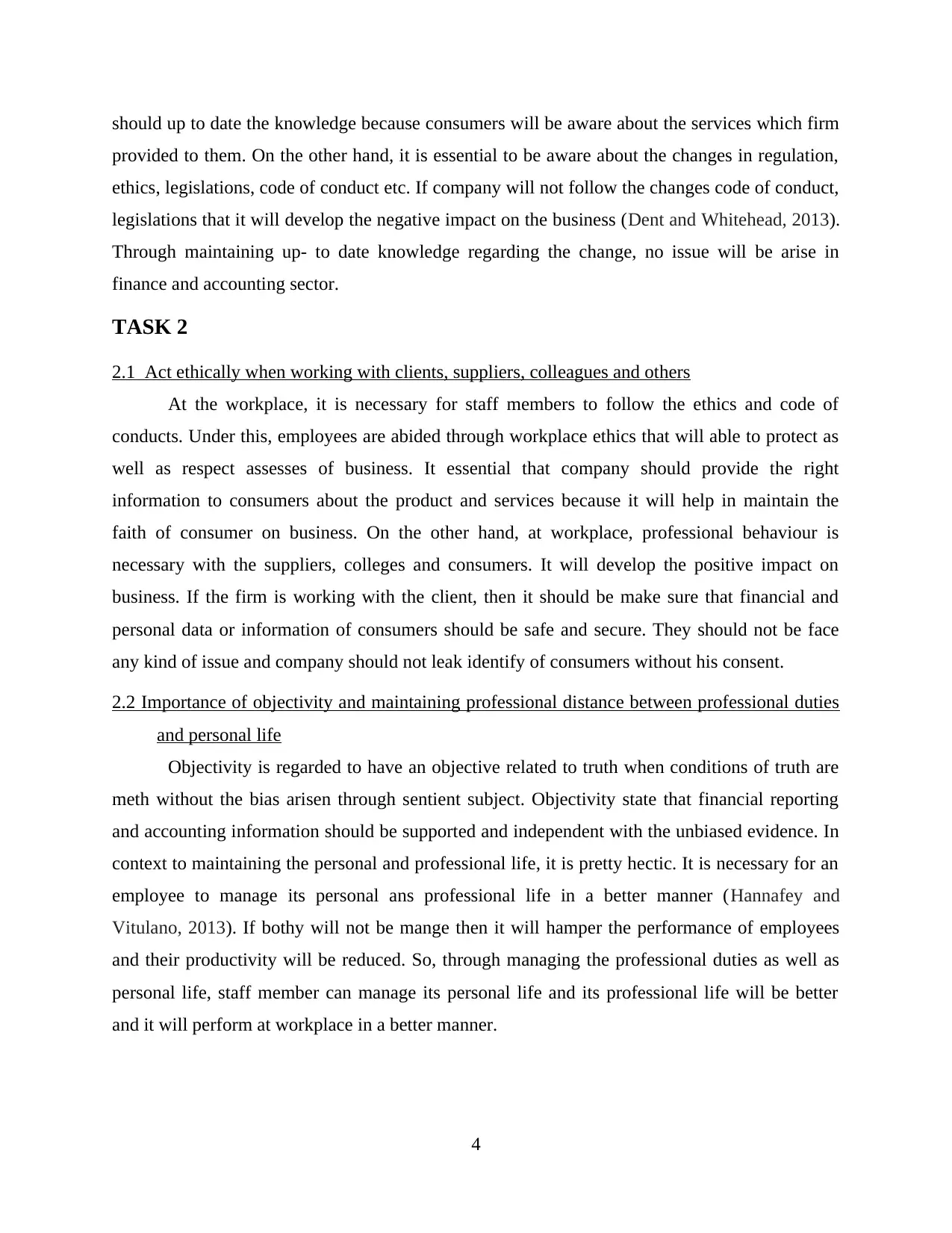
should up to date the knowledge because consumers will be aware about the services which firm
provided to them. On the other hand, it is essential to be aware about the changes in regulation,
ethics, legislations, code of conduct etc. If company will not follow the changes code of conduct,
legislations that it will develop the negative impact on the business (Dent and Whitehead, 2013).
Through maintaining up- to date knowledge regarding the change, no issue will be arise in
finance and accounting sector.
TASK 2
2.1 Act ethically when working with clients, suppliers, colleagues and others
At the workplace, it is necessary for staff members to follow the ethics and code of
conducts. Under this, employees are abided through workplace ethics that will able to protect as
well as respect assesses of business. It essential that company should provide the right
information to consumers about the product and services because it will help in maintain the
faith of consumer on business. On the other hand, at workplace, professional behaviour is
necessary with the suppliers, colleges and consumers. It will develop the positive impact on
business. If the firm is working with the client, then it should be make sure that financial and
personal data or information of consumers should be safe and secure. They should not be face
any kind of issue and company should not leak identify of consumers without his consent.
2.2 Importance of objectivity and maintaining professional distance between professional duties
and personal life
Objectivity is regarded to have an objective related to truth when conditions of truth are
meth without the bias arisen through sentient subject. Objectivity state that financial reporting
and accounting information should be supported and independent with the unbiased evidence. In
context to maintaining the personal and professional life, it is pretty hectic. It is necessary for an
employee to manage its personal ans professional life in a better manner (Hannafey and
Vitulano, 2013). If bothy will not be mange then it will hamper the performance of employees
and their productivity will be reduced. So, through managing the professional duties as well as
personal life, staff member can manage its personal life and its professional life will be better
and it will perform at workplace in a better manner.
4
provided to them. On the other hand, it is essential to be aware about the changes in regulation,
ethics, legislations, code of conduct etc. If company will not follow the changes code of conduct,
legislations that it will develop the negative impact on the business (Dent and Whitehead, 2013).
Through maintaining up- to date knowledge regarding the change, no issue will be arise in
finance and accounting sector.
TASK 2
2.1 Act ethically when working with clients, suppliers, colleagues and others
At the workplace, it is necessary for staff members to follow the ethics and code of
conducts. Under this, employees are abided through workplace ethics that will able to protect as
well as respect assesses of business. It essential that company should provide the right
information to consumers about the product and services because it will help in maintain the
faith of consumer on business. On the other hand, at workplace, professional behaviour is
necessary with the suppliers, colleges and consumers. It will develop the positive impact on
business. If the firm is working with the client, then it should be make sure that financial and
personal data or information of consumers should be safe and secure. They should not be face
any kind of issue and company should not leak identify of consumers without his consent.
2.2 Importance of objectivity and maintaining professional distance between professional duties
and personal life
Objectivity is regarded to have an objective related to truth when conditions of truth are
meth without the bias arisen through sentient subject. Objectivity state that financial reporting
and accounting information should be supported and independent with the unbiased evidence. In
context to maintaining the personal and professional life, it is pretty hectic. It is necessary for an
employee to manage its personal ans professional life in a better manner (Hannafey and
Vitulano, 2013). If bothy will not be mange then it will hamper the performance of employees
and their productivity will be reduced. So, through managing the professional duties as well as
personal life, staff member can manage its personal life and its professional life will be better
and it will perform at workplace in a better manner.
4
Paraphrase This Document
Need a fresh take? Get an instant paraphrase of this document with our AI Paraphraser
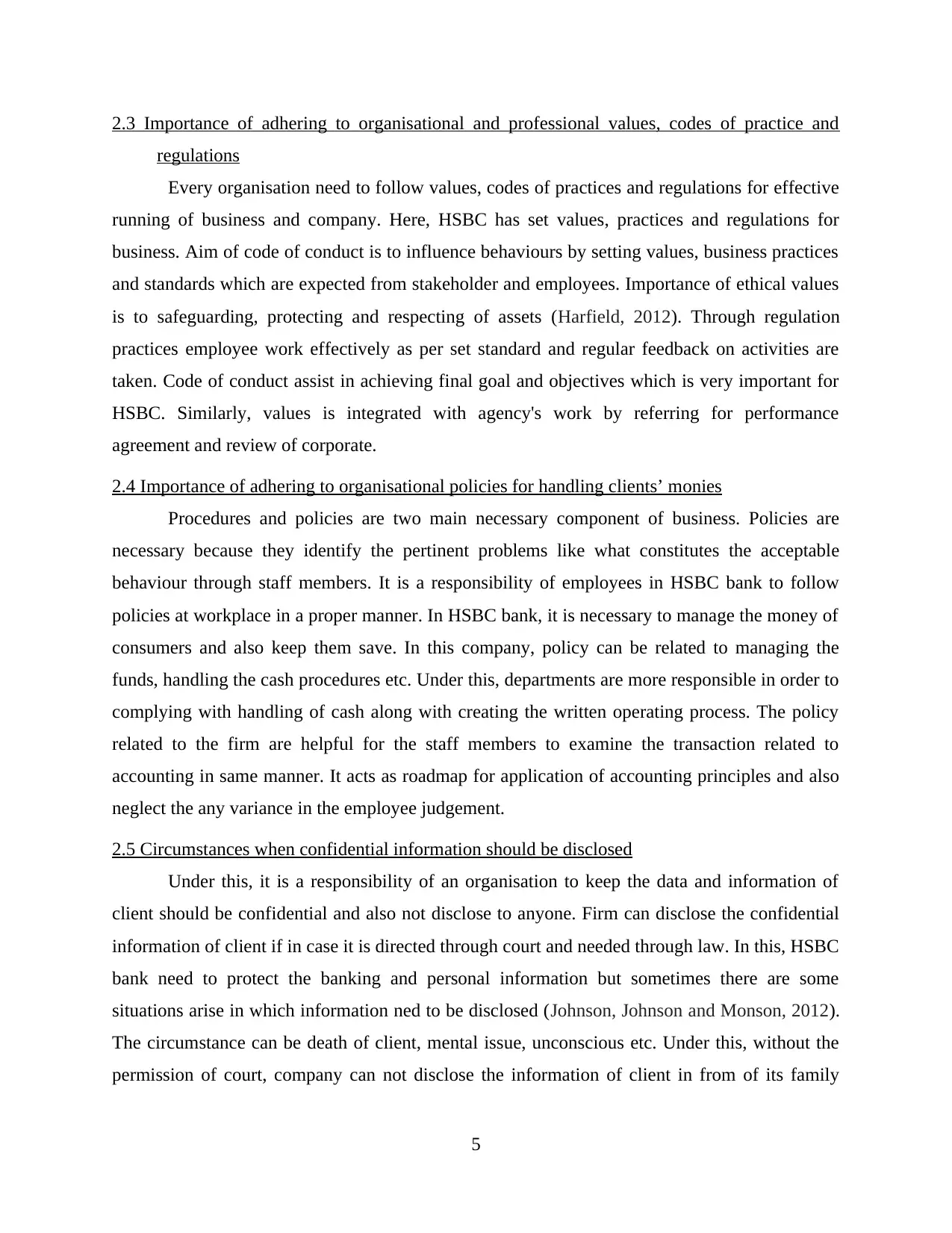
2.3 Importance of adhering to organisational and professional values, codes of practice and
regulations
Every organisation need to follow values, codes of practices and regulations for effective
running of business and company. Here, HSBC has set values, practices and regulations for
business. Aim of code of conduct is to influence behaviours by setting values, business practices
and standards which are expected from stakeholder and employees. Importance of ethical values
is to safeguarding, protecting and respecting of assets (Harfield, 2012). Through regulation
practices employee work effectively as per set standard and regular feedback on activities are
taken. Code of conduct assist in achieving final goal and objectives which is very important for
HSBC. Similarly, values is integrated with agency's work by referring for performance
agreement and review of corporate.
2.4 Importance of adhering to organisational policies for handling clients’ monies
Procedures and policies are two main necessary component of business. Policies are
necessary because they identify the pertinent problems like what constitutes the acceptable
behaviour through staff members. It is a responsibility of employees in HSBC bank to follow
policies at workplace in a proper manner. In HSBC bank, it is necessary to manage the money of
consumers and also keep them save. In this company, policy can be related to managing the
funds, handling the cash procedures etc. Under this, departments are more responsible in order to
complying with handling of cash along with creating the written operating process. The policy
related to the firm are helpful for the staff members to examine the transaction related to
accounting in same manner. It acts as roadmap for application of accounting principles and also
neglect the any variance in the employee judgement.
2.5 Circumstances when confidential information should be disclosed
Under this, it is a responsibility of an organisation to keep the data and information of
client should be confidential and also not disclose to anyone. Firm can disclose the confidential
information of client if in case it is directed through court and needed through law. In this, HSBC
bank need to protect the banking and personal information but sometimes there are some
situations arise in which information ned to be disclosed (Johnson, Johnson and Monson, 2012).
The circumstance can be death of client, mental issue, unconscious etc. Under this, without the
permission of court, company can not disclose the information of client in from of its family
5
regulations
Every organisation need to follow values, codes of practices and regulations for effective
running of business and company. Here, HSBC has set values, practices and regulations for
business. Aim of code of conduct is to influence behaviours by setting values, business practices
and standards which are expected from stakeholder and employees. Importance of ethical values
is to safeguarding, protecting and respecting of assets (Harfield, 2012). Through regulation
practices employee work effectively as per set standard and regular feedback on activities are
taken. Code of conduct assist in achieving final goal and objectives which is very important for
HSBC. Similarly, values is integrated with agency's work by referring for performance
agreement and review of corporate.
2.4 Importance of adhering to organisational policies for handling clients’ monies
Procedures and policies are two main necessary component of business. Policies are
necessary because they identify the pertinent problems like what constitutes the acceptable
behaviour through staff members. It is a responsibility of employees in HSBC bank to follow
policies at workplace in a proper manner. In HSBC bank, it is necessary to manage the money of
consumers and also keep them save. In this company, policy can be related to managing the
funds, handling the cash procedures etc. Under this, departments are more responsible in order to
complying with handling of cash along with creating the written operating process. The policy
related to the firm are helpful for the staff members to examine the transaction related to
accounting in same manner. It acts as roadmap for application of accounting principles and also
neglect the any variance in the employee judgement.
2.5 Circumstances when confidential information should be disclosed
Under this, it is a responsibility of an organisation to keep the data and information of
client should be confidential and also not disclose to anyone. Firm can disclose the confidential
information of client if in case it is directed through court and needed through law. In this, HSBC
bank need to protect the banking and personal information but sometimes there are some
situations arise in which information ned to be disclosed (Johnson, Johnson and Monson, 2012).
The circumstance can be death of client, mental issue, unconscious etc. Under this, without the
permission of court, company can not disclose the information of client in from of its family
5
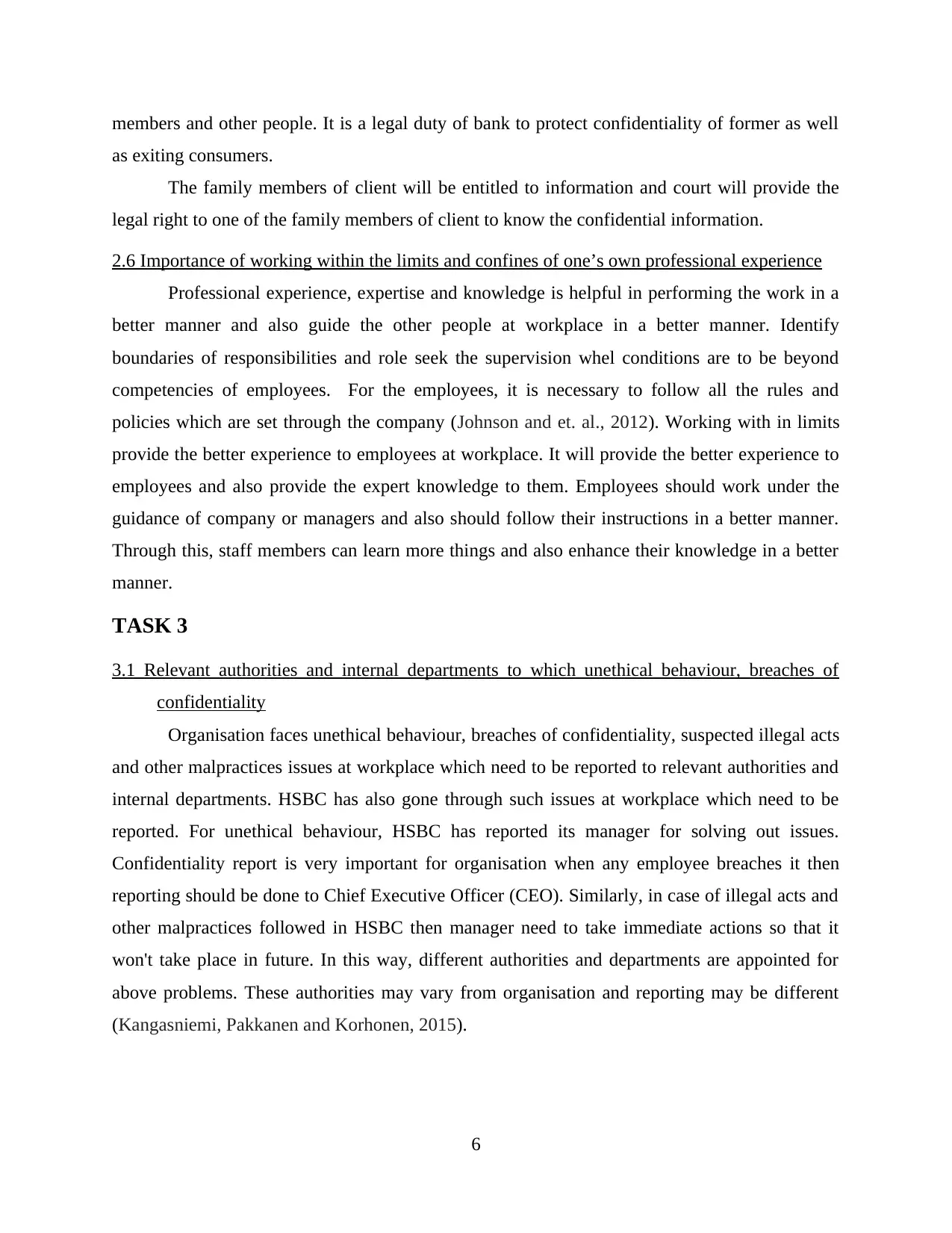
members and other people. It is a legal duty of bank to protect confidentiality of former as well
as exiting consumers.
The family members of client will be entitled to information and court will provide the
legal right to one of the family members of client to know the confidential information.
2.6 Importance of working within the limits and confines of one’s own professional experience
Professional experience, expertise and knowledge is helpful in performing the work in a
better manner and also guide the other people at workplace in a better manner. Identify
boundaries of responsibilities and role seek the supervision whel conditions are to be beyond
competencies of employees. For the employees, it is necessary to follow all the rules and
policies which are set through the company (Johnson and et. al., 2012). Working with in limits
provide the better experience to employees at workplace. It will provide the better experience to
employees and also provide the expert knowledge to them. Employees should work under the
guidance of company or managers and also should follow their instructions in a better manner.
Through this, staff members can learn more things and also enhance their knowledge in a better
manner.
TASK 3
3.1 Relevant authorities and internal departments to which unethical behaviour, breaches of
confidentiality
Organisation faces unethical behaviour, breaches of confidentiality, suspected illegal acts
and other malpractices issues at workplace which need to be reported to relevant authorities and
internal departments. HSBC has also gone through such issues at workplace which need to be
reported. For unethical behaviour, HSBC has reported its manager for solving out issues.
Confidentiality report is very important for organisation when any employee breaches it then
reporting should be done to Chief Executive Officer (CEO). Similarly, in case of illegal acts and
other malpractices followed in HSBC then manager need to take immediate actions so that it
won't take place in future. In this way, different authorities and departments are appointed for
above problems. These authorities may vary from organisation and reporting may be different
(Kangasniemi, Pakkanen and Korhonen, 2015).
6
as exiting consumers.
The family members of client will be entitled to information and court will provide the
legal right to one of the family members of client to know the confidential information.
2.6 Importance of working within the limits and confines of one’s own professional experience
Professional experience, expertise and knowledge is helpful in performing the work in a
better manner and also guide the other people at workplace in a better manner. Identify
boundaries of responsibilities and role seek the supervision whel conditions are to be beyond
competencies of employees. For the employees, it is necessary to follow all the rules and
policies which are set through the company (Johnson and et. al., 2012). Working with in limits
provide the better experience to employees at workplace. It will provide the better experience to
employees and also provide the expert knowledge to them. Employees should work under the
guidance of company or managers and also should follow their instructions in a better manner.
Through this, staff members can learn more things and also enhance their knowledge in a better
manner.
TASK 3
3.1 Relevant authorities and internal departments to which unethical behaviour, breaches of
confidentiality
Organisation faces unethical behaviour, breaches of confidentiality, suspected illegal acts
and other malpractices issues at workplace which need to be reported to relevant authorities and
internal departments. HSBC has also gone through such issues at workplace which need to be
reported. For unethical behaviour, HSBC has reported its manager for solving out issues.
Confidentiality report is very important for organisation when any employee breaches it then
reporting should be done to Chief Executive Officer (CEO). Similarly, in case of illegal acts and
other malpractices followed in HSBC then manager need to take immediate actions so that it
won't take place in future. In this way, different authorities and departments are appointed for
above problems. These authorities may vary from organisation and reporting may be different
(Kangasniemi, Pakkanen and Korhonen, 2015).
6
⊘ This is a preview!⊘
Do you want full access?
Subscribe today to unlock all pages.

Trusted by 1+ million students worldwide
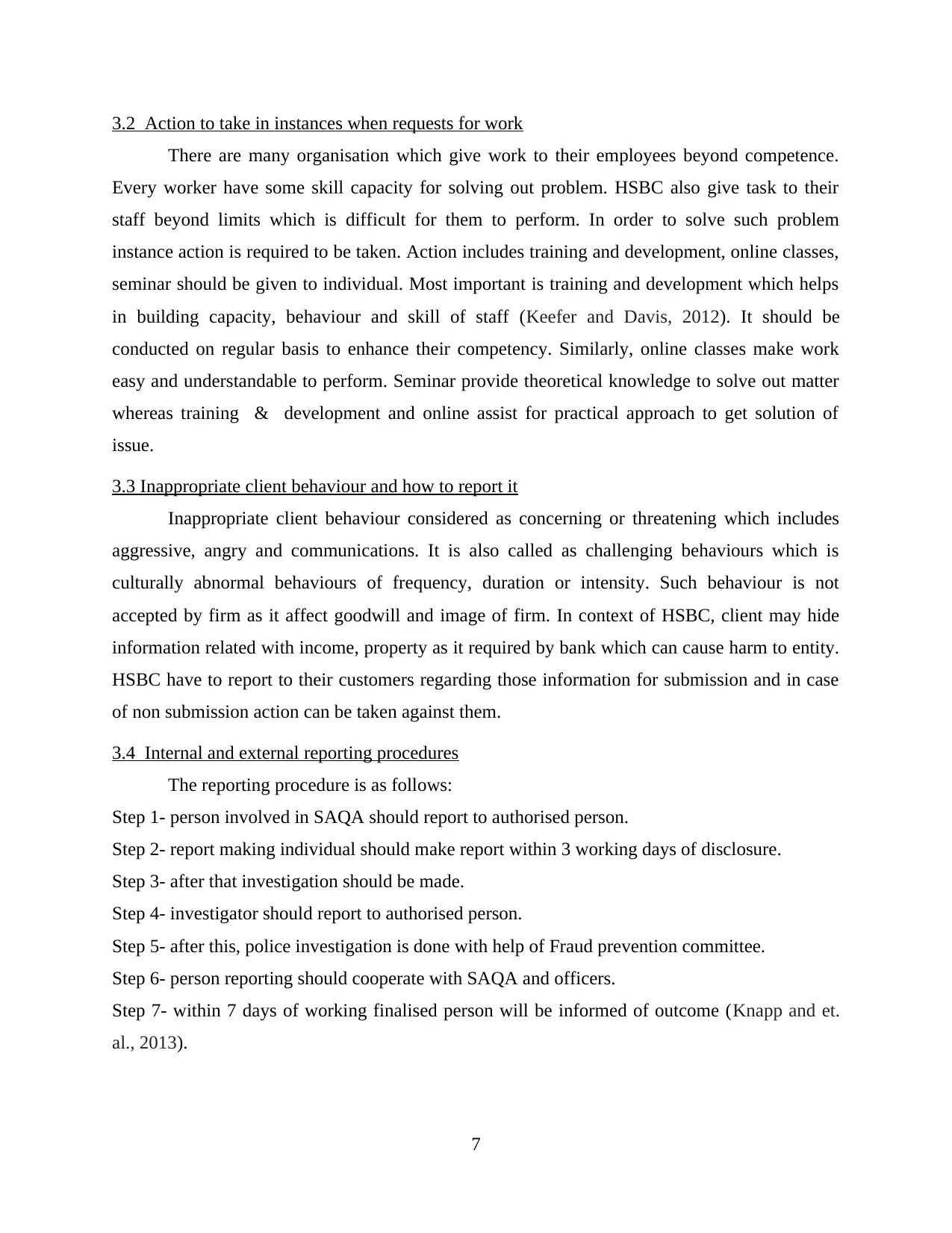
3.2 Action to take in instances when requests for work
There are many organisation which give work to their employees beyond competence.
Every worker have some skill capacity for solving out problem. HSBC also give task to their
staff beyond limits which is difficult for them to perform. In order to solve such problem
instance action is required to be taken. Action includes training and development, online classes,
seminar should be given to individual. Most important is training and development which helps
in building capacity, behaviour and skill of staff (Keefer and Davis, 2012). It should be
conducted on regular basis to enhance their competency. Similarly, online classes make work
easy and understandable to perform. Seminar provide theoretical knowledge to solve out matter
whereas training & development and online assist for practical approach to get solution of
issue.
3.3 Inappropriate client behaviour and how to report it
Inappropriate client behaviour considered as concerning or threatening which includes
aggressive, angry and communications. It is also called as challenging behaviours which is
culturally abnormal behaviours of frequency, duration or intensity. Such behaviour is not
accepted by firm as it affect goodwill and image of firm. In context of HSBC, client may hide
information related with income, property as it required by bank which can cause harm to entity.
HSBC have to report to their customers regarding those information for submission and in case
of non submission action can be taken against them.
3.4 Internal and external reporting procedures
The reporting procedure is as follows:
Step 1- person involved in SAQA should report to authorised person.
Step 2- report making individual should make report within 3 working days of disclosure.
Step 3- after that investigation should be made.
Step 4- investigator should report to authorised person.
Step 5- after this, police investigation is done with help of Fraud prevention committee.
Step 6- person reporting should cooperate with SAQA and officers.
Step 7- within 7 days of working finalised person will be informed of outcome (Knapp and et.
al., 2013).
7
There are many organisation which give work to their employees beyond competence.
Every worker have some skill capacity for solving out problem. HSBC also give task to their
staff beyond limits which is difficult for them to perform. In order to solve such problem
instance action is required to be taken. Action includes training and development, online classes,
seminar should be given to individual. Most important is training and development which helps
in building capacity, behaviour and skill of staff (Keefer and Davis, 2012). It should be
conducted on regular basis to enhance their competency. Similarly, online classes make work
easy and understandable to perform. Seminar provide theoretical knowledge to solve out matter
whereas training & development and online assist for practical approach to get solution of
issue.
3.3 Inappropriate client behaviour and how to report it
Inappropriate client behaviour considered as concerning or threatening which includes
aggressive, angry and communications. It is also called as challenging behaviours which is
culturally abnormal behaviours of frequency, duration or intensity. Such behaviour is not
accepted by firm as it affect goodwill and image of firm. In context of HSBC, client may hide
information related with income, property as it required by bank which can cause harm to entity.
HSBC have to report to their customers regarding those information for submission and in case
of non submission action can be taken against them.
3.4 Internal and external reporting procedures
The reporting procedure is as follows:
Step 1- person involved in SAQA should report to authorised person.
Step 2- report making individual should make report within 3 working days of disclosure.
Step 3- after that investigation should be made.
Step 4- investigator should report to authorised person.
Step 5- after this, police investigation is done with help of Fraud prevention committee.
Step 6- person reporting should cooperate with SAQA and officers.
Step 7- within 7 days of working finalised person will be informed of outcome (Knapp and et.
al., 2013).
7
Paraphrase This Document
Need a fresh take? Get an instant paraphrase of this document with our AI Paraphraser
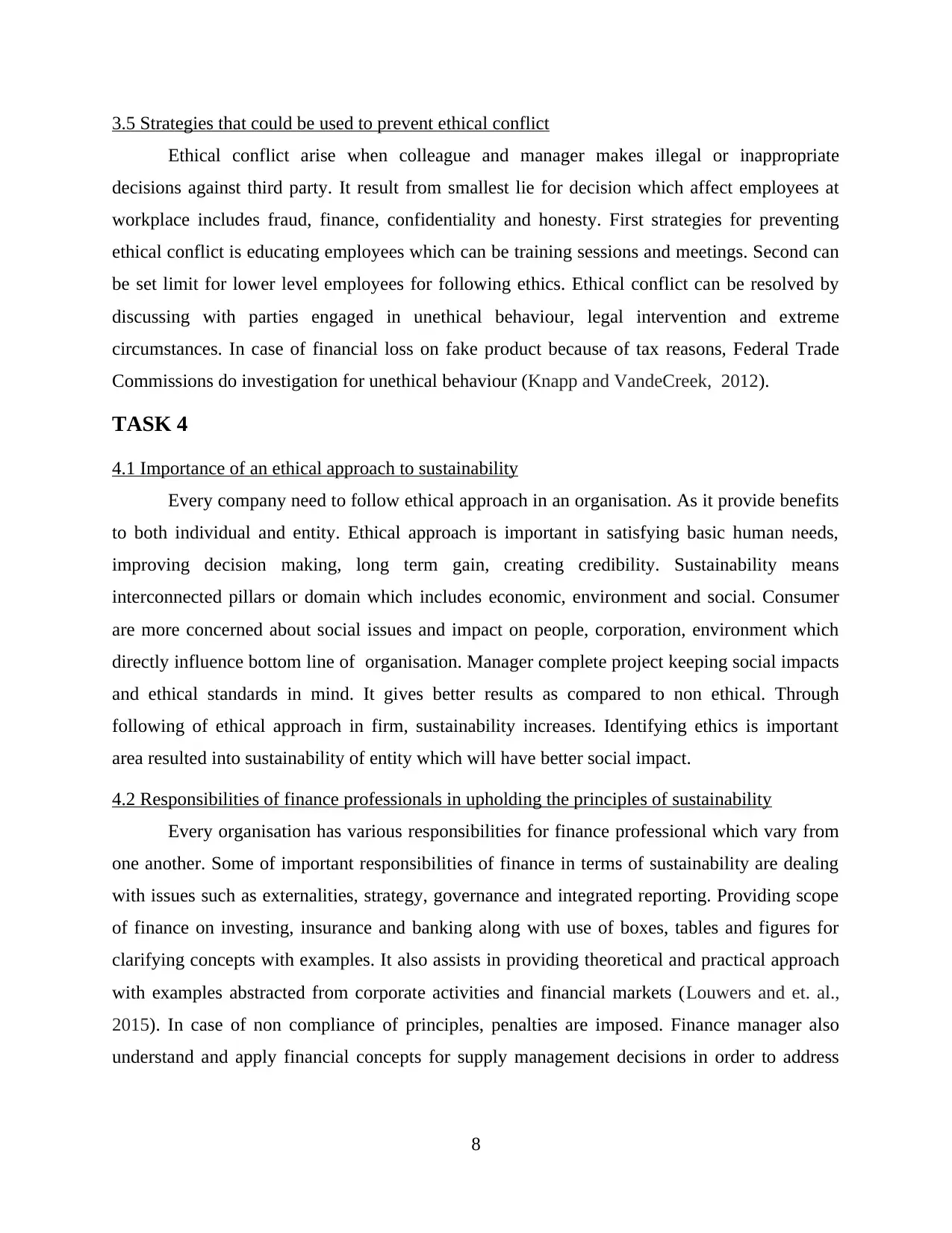
3.5 Strategies that could be used to prevent ethical conflict
Ethical conflict arise when colleague and manager makes illegal or inappropriate
decisions against third party. It result from smallest lie for decision which affect employees at
workplace includes fraud, finance, confidentiality and honesty. First strategies for preventing
ethical conflict is educating employees which can be training sessions and meetings. Second can
be set limit for lower level employees for following ethics. Ethical conflict can be resolved by
discussing with parties engaged in unethical behaviour, legal intervention and extreme
circumstances. In case of financial loss on fake product because of tax reasons, Federal Trade
Commissions do investigation for unethical behaviour (Knapp and VandeCreek, 2012).
TASK 4
4.1 Importance of an ethical approach to sustainability
Every company need to follow ethical approach in an organisation. As it provide benefits
to both individual and entity. Ethical approach is important in satisfying basic human needs,
improving decision making, long term gain, creating credibility. Sustainability means
interconnected pillars or domain which includes economic, environment and social. Consumer
are more concerned about social issues and impact on people, corporation, environment which
directly influence bottom line of organisation. Manager complete project keeping social impacts
and ethical standards in mind. It gives better results as compared to non ethical. Through
following of ethical approach in firm, sustainability increases. Identifying ethics is important
area resulted into sustainability of entity which will have better social impact.
4.2 Responsibilities of finance professionals in upholding the principles of sustainability
Every organisation has various responsibilities for finance professional which vary from
one another. Some of important responsibilities of finance in terms of sustainability are dealing
with issues such as externalities, strategy, governance and integrated reporting. Providing scope
of finance on investing, insurance and banking along with use of boxes, tables and figures for
clarifying concepts with examples. It also assists in providing theoretical and practical approach
with examples abstracted from corporate activities and financial markets (Louwers and et. al.,
2015). In case of non compliance of principles, penalties are imposed. Finance manager also
understand and apply financial concepts for supply management decisions in order to address
8
Ethical conflict arise when colleague and manager makes illegal or inappropriate
decisions against third party. It result from smallest lie for decision which affect employees at
workplace includes fraud, finance, confidentiality and honesty. First strategies for preventing
ethical conflict is educating employees which can be training sessions and meetings. Second can
be set limit for lower level employees for following ethics. Ethical conflict can be resolved by
discussing with parties engaged in unethical behaviour, legal intervention and extreme
circumstances. In case of financial loss on fake product because of tax reasons, Federal Trade
Commissions do investigation for unethical behaviour (Knapp and VandeCreek, 2012).
TASK 4
4.1 Importance of an ethical approach to sustainability
Every company need to follow ethical approach in an organisation. As it provide benefits
to both individual and entity. Ethical approach is important in satisfying basic human needs,
improving decision making, long term gain, creating credibility. Sustainability means
interconnected pillars or domain which includes economic, environment and social. Consumer
are more concerned about social issues and impact on people, corporation, environment which
directly influence bottom line of organisation. Manager complete project keeping social impacts
and ethical standards in mind. It gives better results as compared to non ethical. Through
following of ethical approach in firm, sustainability increases. Identifying ethics is important
area resulted into sustainability of entity which will have better social impact.
4.2 Responsibilities of finance professionals in upholding the principles of sustainability
Every organisation has various responsibilities for finance professional which vary from
one another. Some of important responsibilities of finance in terms of sustainability are dealing
with issues such as externalities, strategy, governance and integrated reporting. Providing scope
of finance on investing, insurance and banking along with use of boxes, tables and figures for
clarifying concepts with examples. It also assists in providing theoretical and practical approach
with examples abstracted from corporate activities and financial markets (Louwers and et. al.,
2015). In case of non compliance of principles, penalties are imposed. Finance manager also
understand and apply financial concepts for supply management decisions in order to address
8
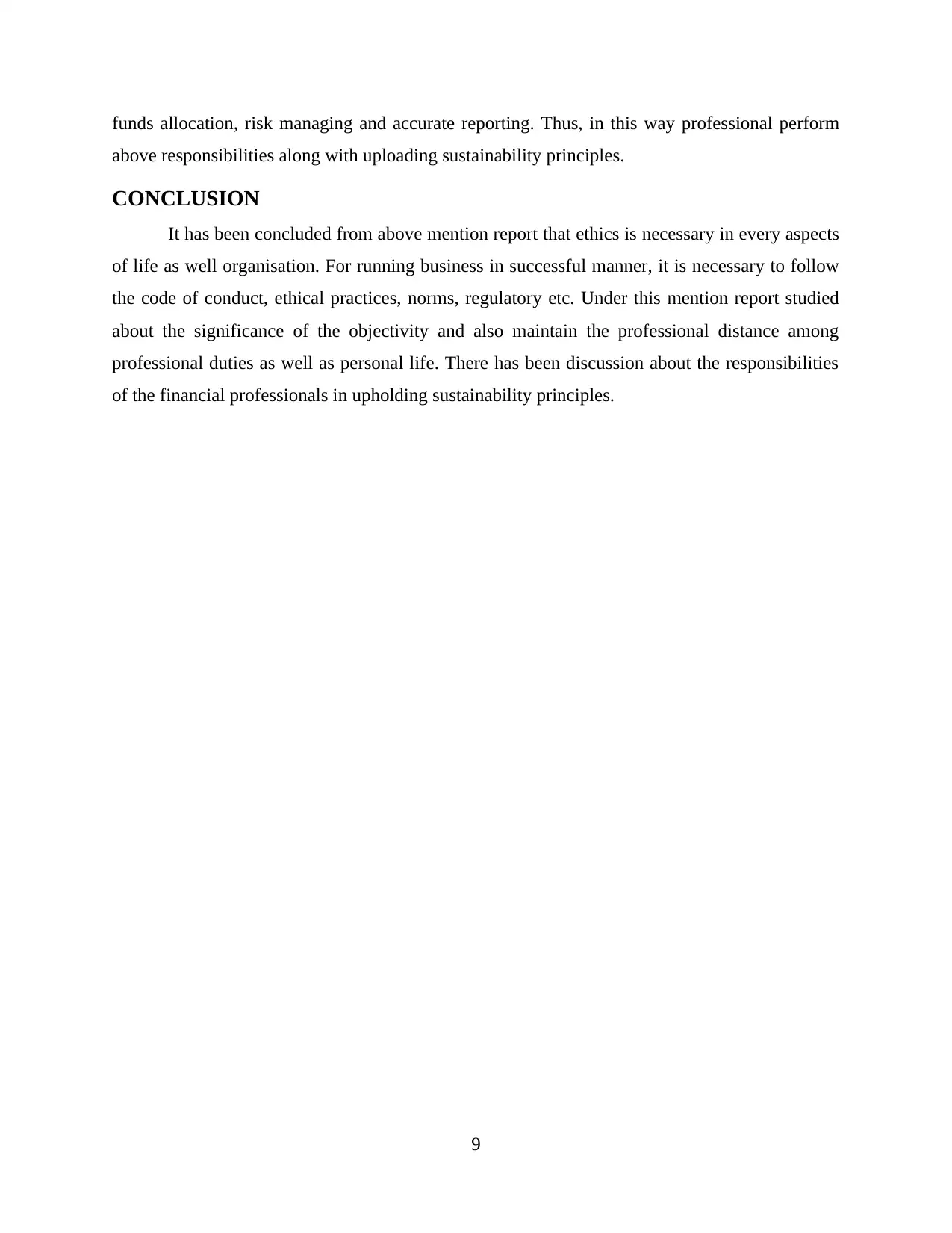
funds allocation, risk managing and accurate reporting. Thus, in this way professional perform
above responsibilities along with uploading sustainability principles.
CONCLUSION
It has been concluded from above mention report that ethics is necessary in every aspects
of life as well organisation. For running business in successful manner, it is necessary to follow
the code of conduct, ethical practices, norms, regulatory etc. Under this mention report studied
about the significance of the objectivity and also maintain the professional distance among
professional duties as well as personal life. There has been discussion about the responsibilities
of the financial professionals in upholding sustainability principles.
9
above responsibilities along with uploading sustainability principles.
CONCLUSION
It has been concluded from above mention report that ethics is necessary in every aspects
of life as well organisation. For running business in successful manner, it is necessary to follow
the code of conduct, ethical practices, norms, regulatory etc. Under this mention report studied
about the significance of the objectivity and also maintain the professional distance among
professional duties as well as personal life. There has been discussion about the responsibilities
of the financial professionals in upholding sustainability principles.
9
⊘ This is a preview!⊘
Do you want full access?
Subscribe today to unlock all pages.

Trusted by 1+ million students worldwide
1 out of 13
Related Documents
Your All-in-One AI-Powered Toolkit for Academic Success.
+13062052269
info@desklib.com
Available 24*7 on WhatsApp / Email
![[object Object]](/_next/static/media/star-bottom.7253800d.svg)
Unlock your academic potential
Copyright © 2020–2026 A2Z Services. All Rights Reserved. Developed and managed by ZUCOL.





